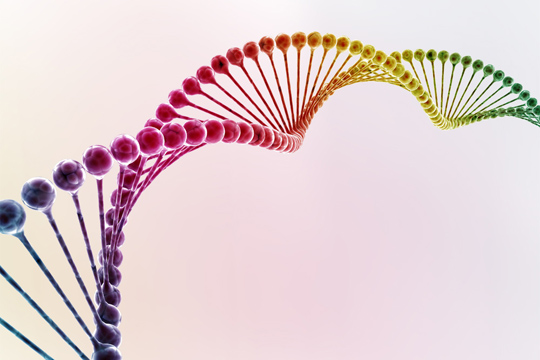“The Gene of the Week” Receives Special Prize
Award for biologist Theresa Schredelseker in the “Wissenschafts-Blogs des Jahres 2019” competition
Writing vividly and comprehensibly: Theresa Schredelseker wants to convey the fascination of genes to her readers. Photo: Klaus Polkowski

“A unit that is inherited and that produces a specific characteristic” – that’s the one hundred year old definition of the gene. Photo: Jezper – stock.adobe.com
Ms Schredelseker, what exactly is a gene? Can you explain in two or three sentences?
Theresa Schredelseker: In principle we can refer back to the one hundred year old definition of the Danish biologist Wilhelm Johannsen: the gene is a unit that is inherited and that produces a specific characteristic. Even if – or precisely because – back then they had no idea what material genes consisted of, there’s still a lot to this. Today we can go a bit deeper. We’ve discovered that genes are parts of the DNA that serve as a pattern for the construction of proteins or biologically active RNA molecules.
Do you see yourself as a geneticist?
I studied biology and did my Master’s in molecular medicine. My current doctoral thesis – which I am just sending off to be printed – also derives from this field. But I work here at the Chair of Developmental Biology, or more precisely in Embryology – and this department is very closely linked with genetics. So yes, I would call myself a geneticist.
You’ve been writing your blog “Das Gen der Woche” or “The Gene of the Week” since 2016. Why do you do it?
I just find the subject extremely exciting. And I’ve always enjoyed passing on this fascination to others. I’ve also received feedback that I’m succeeding with this. So I thought, why not also do it in the form of a blog?
When did you learn that your blog had won a prize for outstanding science communication?
I was at a conference and shortly before the next event a woman congratulated me on the prize. I didn’t know a thing about it, I hadn’t submitted my blog for the prize. I said, “Oh, you’ll have to tell me more after the event” – and of course I was delighted.
How much time do you invest in the blog?
Originally I wanted to introduce a new gene each week. But after a while it was just too time-consuming. A new post can take up a whole Sunday. I read up on a few things, incorporate graphics or videos. So in total it definitely takes six or seven hours of work.
Do you know much about your readers?
Sadly my mother isn’t one [laughs]. She says, “No one understands that!” It tends to be more of a specialist audience. But my aim is to make it vivid and comprehensible.
And you’re succeeding! For example with your latest article, about tardigrades, where they’ve found a gene that makes them resistant to radiation. Could this characteristic be transferred to humans? Or is that pure science fiction?
There’s still very little known about this gene. And we don’t know anything about the mechanism that creates radiation resistance. I think it would technically be possible. But the question is whether we’d want it.
Go on!
A little while ago they developed this powerful tool, CRISPR, to produce genetically-altered organisms. Everyone who works in our scientific field knew straight away what was possible with this. Then the USA initiated a moratorium: a common agreement not to apply this tool to the human germinal line for the time being. At any rate not for the purpose of enhancement, that is the expansion and improvement of human characteristics. But it may be okay where genetic therapy is concerned, for a healthy life without suffering. But even that will only be possible once we understand the technology more thoroughly.
Do you already know which gene you want to present next?
I have a list, but it just keeps getting longer, because usually I simply decide spontaneously to write about a gene when an interesting paper has just been published. Or if we are discussing it intensively here in the laboratory. But now I have a question I’d very much like to ask: do you understand now what a gene is?
Better than ever before! Thank you, Ms Schredelseker.


